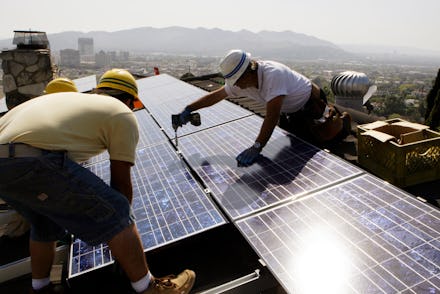The Trump administration is ignoring one of the fastest-growing sources of new US jobs: Renewables

If President Donald Trump really cares about job creation, he might want to rethink his stance on those unsightly wind farms.
Renewable energy is becoming a major engine for U.S. employment: In recent years, jobs in solar and wind energy are growing about 12 times faster than the rest of the U.S. economy, according to a new report from the Environmental Defense Fund.
The report also found that these difficult-to-outsource jobs pay about $5,000 more than the national median wage. Study authors arrived at their findings by examining a combination of data from the International Renewable Energy Agency, the Bureau of Labor Statistics and the Department of Energy.
Many of the jobs are easy to train for, too: Trade groups, like nonprofit Solar Energy International, offer accreditations you can get in less than a week.
For an administration that's ostensibly about empowering the middle class with better-paying jobs, promoting the renewable energy sector seems like it would be a no-brainer.
But Trump's team has reportedly floated the idea of scrapping the Office of Energy Efficiency and Renewable Energy within the Department of Energy.
Compared to more traditional energy jobs in industries like coal, the employment "return on investment" for renewables is far higher. For every $1 million invested in energy efficiency, approximately eight jobs are created — compared to roughly three jobs in fossil fuels, the report found.
There's also a lot more room for growth.
Renewable energy accounted for about 13% of energy consumption in 2015, according to Department of Energy figures. Coal accounts for a full third, despite its harmful impact on the environment. As solar panels become cheaper and more efficient, that 13% figure should only rise.
But the renewables sector's future remains uncertain under Trump's presidency.
A lot of credit for new jobs created goes to Uncle Sam: For one, there's the Solar Investment Tax Credit, a 30% credit enacted in 2006 and extended in 2008 that helped business and families pay for new solar panels.
And in 2015, former President Barack Obama announced solar initiatives that would train some 75,000 new workers, many of them military veterans.
The industry is unlikely to receive such treatment from the current administration.
The word "renewables" doesn't even appear on the current White House's energy plan — a sharp contrast with Obama's energy page, the archived version of which touts a recent climate agreement with China.
Sign up for The Payoff — your weekly crash course on how to live your best financial life. Additionally, for all your burning money questions, check out Mic’s credit, savings, career, investing and health care hubs for more information — that pays off.